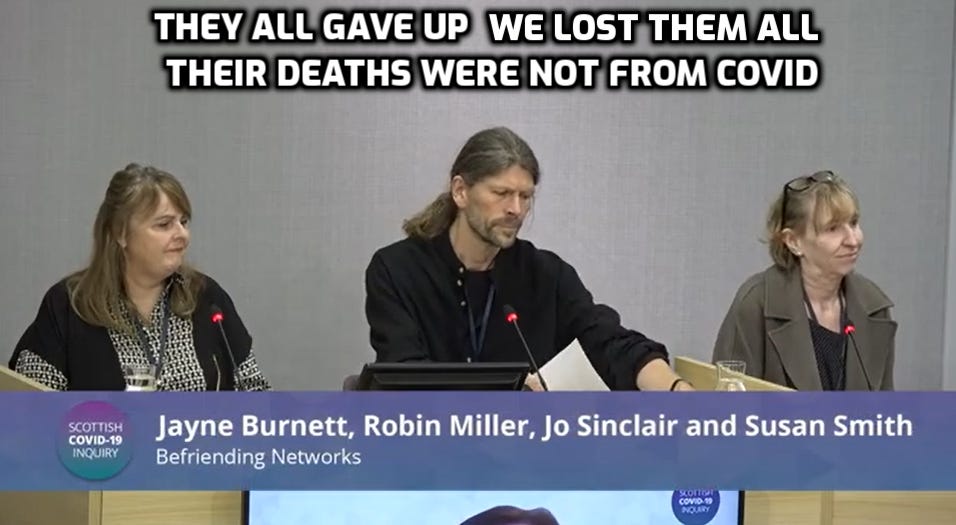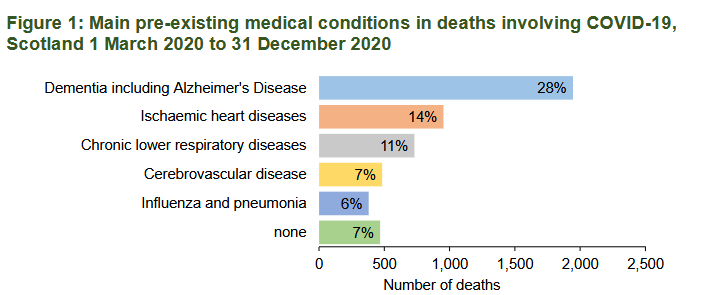Scottish COVID-19 Inquiry|16 Dec 2024
Extraordinary testimony by members of Befriending Networks.
Introduction
Befriending Networks testimony by Jayne Burnett Manager of Visiting Friends and a former nurse. Robin Miller Project Coordinator of Cowal Befrienders. Susan Smith (testifying remotely) from Highland Hospice and 2019 ‘Nurse of the Year’ nominee. Jo Sinclair-Project Manager Caraidean Uibhist a befriending organisation in place across five island communities of Eriskay, South Uist, Benbecula, North Uist and Berneray.
Pupils and teachers from Leith Academy were cited to be in public gallery.
Testimony highlights
Impacts
Yet more shocking admissions at the Scottish COVID inquiry demonstrating how lockdown isolation policies and media fear mongering was severely harming people’s wellbeing. Even those in good health resorted to not opening letters for a upto a week due to infection risks and were refusing to leave their home to buy food for fear of catching ‘the virus’.
‘‘Their fridges were run down, their cupboards were empty…just because of what they seen in the media.’’
-Jo Sinclair
More alarmingly, these policies were then said to be responsible for deaths of entire vulnerable groups, in this instance, elderly people with Dementia who during ‘the pandemic’ died the most 'involving COVID-19'. They simply ‘‘gave up’’ and died which is what Alison Walker (who testified at the Scottish inquiry) previously stated on GB News to Neil Oliver with regards to dementia patients. 'Thousands died probably because more through isolation...they gave up.'
‘‘They ALL gave up…we did lose them ALL..and their deaths weren’t actually from COVID directly…they didn’t actually keep on going.’’
-Jo Sinclair
Lockdown death
Once more the harms from COVID polices is evidenced by Ms.Jayne Burnett, a former nurse. During lockdown here was no support available from GPs, medical practises or social workers. Eldery people with dementia were adversly impacted the most.
‘‘The people requiring help especially those with dementia was HUGE…
..we had one chap..routine is so important in dementia..this chap went out everyday for his lunch..suddenly he wasn’t able to…and he died shortly afterwards.’’
‘‘People’s health declined SERIOUSLY as a result of not being able to pursue the things that kept them alive and vital.’’
‘‘Lockdown was particularly hard on our clients.’’
Isolation harms
Another witness (Mr.Robin Miller) testifies about the health harms from prolonged isolation.
‘‘The damaging effects of continual social isoaltion and loneliness for our older people who were really struggling with that and it was having a negative effect on their health.’’
Volunteers who would normally have been attending the care needs of vulnerable clients could no longer offer support due to COVID policies.
‘‘The clients usually had health conditions that were deteriorating and contiuned to deteriorate and somtimes deteriorated quicker that we would have envisaged pre COVID.’’
-Susan Smith- 2019 nurse of the year nominee
Fear based approach
I’m quite sure these points will hit home and are some of the most important discussed thus far at the inquiry.
‘‘The stories we were hearing about people were particulary harrowing at times.’’
‘‘There was good evidence that was out there in major documentation saying that people who were lonely and isolated were MORE at risk of RESPIRATORY illness and they have less a response to vaccines.’’
‘‘Yet what were we doing to our elderly?..we were locking them up and keeping them away from the things that made them healthy.’’
Ongoing impacts of fear
GPs had ‘barriers’ up in surgeries 2 years after ‘COVID.’
‘‘One of the most alarming things for me now is i see many many older people who are very reluctant to contact their GPs..that relationship has been lost.’’
Statment highlights
‘‘People living with dementia died during the pandemic, not from COVID-19, but their lives were shortened because they did not understand what was going on and they gave up.’’
‘‘The number of requests for support for people with dementia increased dramatically and the level of support needs they had was more critical than the usual client group of befriending organisations.’’
-Paragraph 4.1 (d)
‘‘Eating disorders thrive in isolation and there have been increased referrals for people with eating disorders since the start of the pandemic (and waiting lists are long).’’
-Paragraph 4.1 (f)
‘‘Some older people have not gone outside again following the pandemic, due to fear.’’
-Paragraph 4.1 (g)
‘‘One participant explained that they are aware of research that shows that isolation decreases people's response to vaccines and increases the risk of respiratory illness.’’
-Paragraph 4.1 (h)
‘‘Some older people are still reluctant to contact their GP because they think that they are overwhelmed and busy.’’
-Paragraph 4.3 (c)
‘‘Children and young people having been out of school during the pandemic is still having a "huge impact", with some children still not attending school.’’
-Paragraph 4.5 (a)
‘‘Some people were getting information about the pandemic only from the television (particularly in rural areas). People assumed that if they left their house they were going to die.’’
-Paragraph 4.6 (a)
‘‘Participants had a difference of opinion as to the usefulness of statistics about COVID-19. Some organisations considered that statistics were helpful initially when weighing up the risks to staff and clients. Others considered that the statistics scared people at the beginning, rather than being helpful.’’
-Paragraph 12.1 (f)
Conclusions
Why are the following ‘assumptions’ over COVID-19 and excess deaths accepted as surely they do not stand upto to real world scrutiny?
‘‘The number of deaths involving dementia that also had COVID-19 mentioned on the death certificate represented 99% of the number of excess deaths involving dementia. This supports our assumption that excess deaths registered involving dementia in 2020 (2,177) could almost wholly be attributed to COVID-19.’’
‘‘A participant remarked that older people felt that they were robbed of their final few years. The decisions made for them during the pandemic impacted their agency. People should have been given an informed choice about whether to isolate, knowing the risks.’’
-Paragraph 15.1 a) of statement
Thanks for your attention. Please help share this information.
X links:
End






Most people trusted public health which was used to terrify the population that there was a 'deadly' virus on the loose. I still talk to people who wholeheartedly believe they have gone through a 'covid pandemic' my neighbour is still taking the covid injections to protect himself. The brainwashing and psychological manipulation is so strong that I do not know what will reverse it. All of the vulnerable people who died have gone unnoticed by the general public I have not met one person who talks about it. All the checks and balances that kept society running reasonably well and also provided protection for our vulnerable people were removed and this did not happen by accident, their deaths were put to good use to bolster the pandemic story, the government wanted a desired result and they were determined to achieve it no matter the cost to the vulnerable. They knew what would happen and they had the perfect scapegoat "covid".
And yet they're determined to do it all again